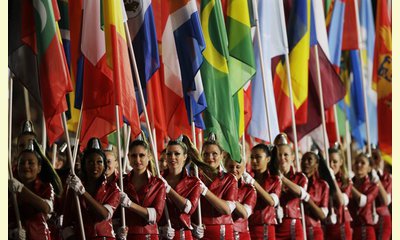|
|
UN envoy on sport for peace praises ‘exemplary’ Summer Olympics
an article by UN News Centre
Video: Women in 2012 Olympics
The United Nations envoy on sport for peace today [13 August] lauded the London 2012 Olympic Games for their remarkable displays of athletic achievement, as well as for paving the road for future successes in promoting social change in a range of areas, from gender equality to peace building.
The United Nations envoy on sport for peace today [13 August] lauded the London 2012 Olympic Games for their remarkable displays of athletic achievement, as well as for paving the road for future successes in promoting social change in a range of areas, from gender equality to peace building.

click on photo to enlarge
“I wish to congratulate the organizers, athletes, spectators and even more so the many volunteers whose remarkable efforts and support have been exemplary from start to finish,” the Secretary-General’s Special Adviser on Sport for Development and Peace, Wilfried Lemke, said in a news release.
“There were a number of notable occasions and initiatives before and during these 17 days of competition that contributed to the legacy that these Games will have in the long run,” he added.
Mr. Lemke pointed to the historic inclusion of female athletes in all sporting delegations, including Saudi Arabia, noting that bridging the gender gap would “help change mentalities” and was “a very encouraging step in the fight for gender equality and women’s empowerment in and through sport.”
According to the International Olympic Committee, Saudi Arabia sent two female athletes – Wodjan Ali Seraj Abdulrahim Shahrkhani, who competed in judo, and Sarah Attar, who competed in athletics – to the London Games. The 2012 edition of the Summer Olympics also broke the gender barrier with every sporting event featuring both male and female competitions.
Turning to the Game’s numerous sporting successes, Mr. Lemke also celebrated the vast reduction in reports of doping among Olympic athletes while also applauding the demonstrations of dialogue and friendship on display throughout the two-week event.
At the same time, he noted that while the global call for a cessation of hostilities around the world had not gone entirely heeded, it still had had a resounding effect on the Games themselves.
“Even though a full observance of the Olympic Truce, meaning a cessation of hostilities during the Games, was not achieved, its spirit was definitely brought to life by a vast number of peace building and conflict prevention initiatives carried out worldwide, as well as by the exemplary behaviour shown by athletes, spectators and volunteers,” Mr. Lemke said.
In 2011, the 193 UN Member States co-sponsored a General Assembly resolution calling for the observance of an Olympic Truce and exhorting the cessation of all conflicts during the sports event. The resolution for this year’s Games was the first time that all 193 UN Member States co-sponsored it and passed it unanimously
The envoy’s office also noted that the Games provided the UN system with a global platform to promote numerous objectives, with various UN agencies taking part in awareness-raising campaigns and community programmes, as well as disease surveillance and environmental-protection initiatives.
|








|
DISCUSSION
Question(s) related to this article:
What other resources can be utilized to give women more opportunities?,
* * * * *
LATEST READER COMMENT:
On their website, the United Nations Population Fund makes it clear that lack of access to family planning is a form of violence against women.
"Gender-based violence both reflects and reinforces inequities between men and women and compromises the health, dignity, security and autonomy of its victims. It encompasses a wide range of human rights violations, including sexual abuse of children, rape, domestic violence, sexual assault and harassment, trafficking of women and girls and several harmful traditional practices. Any one of these abuses can leave deep psychological scars, damage the health of women and girls in general, including their reproductive and sexual health, and in some instances, results in death.
Violence against women has been called "the most pervasive yet least recognized human rights abuse in the world." Accordingly, the Vienna Human Rights Conference and the Fourth World Conference on Women gave priority to this issue, which jeopardizes women's lives, bodies, psychological integrity and freedom. Violence may have profound effects – direct and indirect – on a woman's reproductive health, including:
Unwanted pregnancies and restricted access to family planning information and contraceptives
Unsafe abortion or injuries sustained during a legal abortion after an unwanted pregnancy
Complications from frequent, high-risk pregnancies and lack of follow-up care
Sexually transmitted infections, including HIV
Persistent gynaecological problems
Psychological problems
Gender-based violence also serves – by intention or effect – to perpetuate male power and control. It is sustained by a culture of silence and denial of the seriousness of the health consequences of abuse. In addition to the harm they exact on the individual level, these consequences also exact a social toll and place a heavy and unnecessary burden on health services.
UNFPA recognizes that violence against women is inextricably linked to gender-based inequalities. When women and girls are expected to be generally subservient, their behaviour in relation to their health, including reproductive health, is negatively affected at all stages of the life cycle.
UNFPA puts every effort into breaking the silence and ensuring that the voices of women are heard. At the same time, the Fund works to change the paradigm of masculinity that allows for the resolution of conflict through violence. . ...more.

|
|









